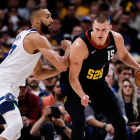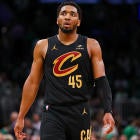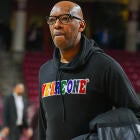
Zach LaVine is a tricky trade candidate as all-offense guards aren't exactly in vogue right now. The whole league has watched Milwaukee's defense sputter with Damian Lillard in Jrue Holiday's place, and Lillard is a better shot-creator than LaVine has ever been. Compounding matters is LaVine's injury history (long) and his contract (longer). Will teams be enthused about paying LaVine $49 million in 2027 when he's a 31-year-old with a history of knee troubles?
No, but they weren't enthused about the yucky back half of Lillard's contract either. The Bucks still traded for him, and several other teams tried. Playoff-caliber shot-creation remains the most valuable single trait in basketball, and teams are willing to risk quite a bit to find it. And make no mistake, trading for LaVine would be a risk.
His scoring is down to 21.9 points per game, the lowest mark he's hit since the 2017-18 season in which he was coming off of a torn ACL. His 3-point shooting will probably bounce back, but will his burst? The theory of LaVine relies pretty heavily on beating even high-end defenders off of the dribble. He is currently shooting below 50% on drives for the first time since the 2019-20 season. He's making only 61.4% of his shots within three feet of the rim right now. At his peak, he was making 70% of them. He's never been better than "not bad" defensively, though he's frequently been worse, and he's never averaged five assists per game.
A team trading for LaVine is a team, in essence, that is trying to trade for a bucket. That's it. That's what he brings to the table. The best version of him does it extraordinarily well, and has never had the chance to do so within a healthy offensive ecosystem. The Bulls don't have a point guard and never shoot 3's. Imagine how he'd benefit playing next to a playmaker like LeBron James or off of the gravity generated by Stephen Curry. He might be worse physically than his younger self, but he has a chance to land in a much better situation.
So where will that situation be, now that the Bulls are apparently taking the idea of a LaVine trade seriously? Here are five of the best fits on the board:
Los Angeles Lakers
They're the obvious fit, and for good reason. LaVine played collegiately at UCLA. He's represented by Klutch Sports, who also rep LeBron James and Anthony Davis (and more than a dozen Laker role players over the past several years). They've talked a big game about prioritizing depth and internal development since last year's trade deadline, but these are the Lakers we're talking about here. They'll always be big-game hunters. And, right now, they're probably a big addition away from serious contention.
The offense dies whenever James goes to the bench, dipping by over 15 points per 100 possessions. Even when James plays, it hasn't been elite. There's too much overlap between Austin Reaves and D'Angelo Russell. LaVine, who is more explosive, provides sorely needed contrast, and he can function comfortably enough without the ball to enhance the two core actions of the Laker offense: the James-Davis pick-and-roll and the more varied James-Reaves two-man game. Jarred Vanderbilt offers some of the same theoretical defensive protection that Alex Caruso has in the past. If there's a way for the Lakers to potentially add extra draft capital to bring Caruso home with LaVine? Doing so probably makes sense. He doesn't come with quite as many offensive drawbacks as Vanderbilt does.
The Lakers can't do a thing until December, and, more realistically, are paralyzed until Jan. 15. That's when all of the the free-agent contracts they signed over the summer are officially trade-eligible. Until then, the Lakers simply can't match salaries. Their 2029 first-round pick is the headline asset, but keep an eye out for their 2027 pick as well. Last season, they traded it to the Jazz in the Russell Westbrook blockbuster... but protected it 1-4. As that pick doesn't roll over into future years, the Lakers can trade the currently protected portion of it without the Stepien Rule getting in the way. Toss in a few swaps and the Lakers have real value to play with here.
Philadelphia 76ers
How badly does Daryl Morey want another star ball-handler type? Before the season, the answer was probably "quite a bit." The James Harden-Tyrese Maxey backcourt duopoly led to stellar regular-season offense last season. But Maxey has ascended to a new level offensively this season, and while the argument could be made that he would benefit from a bit of extra ball-handling around him, he's ideally looking for more of a passer, not another scorer. The two of them would be among the NBA's worst defensive backcourts. A trade for LaVine all but punts away Morey's 2024 cap space.
But Morey, like the Lakers, is a big-game hunter, so a Philadelphia team that recently refreshed its asset pool and has several expiring deals to offer will always be in the mix for players like LaVine, and, if nothing else, the Maxey-LaVine-Joel Embiid trio would be nearly unguardable. Most NBA teams can't account for two guards as quick as LaVine and Maxey, and those that can risk getting clobbered inside by Joel Embiid. The 76ers are playing so well right now that a deal like this isn't exactly likely, but it can't be ruled out either.
Miami Heat
The Heat learned with relative certainty this offseason that they lack the assets to trade for an A-lister. No, they're not going to be in the mix if Luka Doncic or Embiid or Giannis Antetokounmpo ever become available. They just don't have enough to trade. That's why they don't have Lillard right now. If they want another star-level shot-creator, they're going to have to trade for someone a bit more flawed, someone like LaVine.
Miami's shot-creation woes have continued into this season. The Heat rank 26th in half-court points per 100 possession. Tyler Herro is injured and Jimmy Butler's scoring numbers are conspicuously declining. This team's upside, on a night-to-night basis, is preposterously low for a reigning finalist. The Heat haven't won a game by double-digits yet this season. Not even once.
Miami can match salary here without disturbing its rotation too much. Kyle Lowry does most of the heavy lifting, with Duncan Robinson likely filling in the rest. That would allow the Heat to keep Herro next to LaVine and perhaps turn offense into an actual Miami strength. Would that create some defensive vulnerability? Sure, but Erik Spoelstra can squeeze lemonade out of any vaguely yellow, lemon-shaped rock. He'll make it work. Having Bam Adebayo goes a long way in this respect. The Heat aren't a viable contender in a world in which Boston, Philadelphia and Milwaukee have all improved on paper. They need to make an upgrade of some sort to stand a chance.
Golden State Warriors
LaVine would be such an out-of-character addition for the Warriors, but these sorts of gambles are ironically very in-character for the Warriors. If Steve Kerr could coax team basketball out of Andrew Wiggins, he can make it work for almost anybody. The Warriors still have enough draft capital to make a real run at LaVine. The need is obvious. Stephen Curry is the only Warrior to top more than 20 points in a game this season. Golden State sorely needs added firepower. The real question here is matching salary.
The off-hand answers like Chris Paul and Andrew Wiggins come with complications. Who defends opposing perimeter stars if not Wiggins? Gary Payton II can do so, but too many of his minutes stifles the offense. Paul has miraculously turned Golden State's bench into a genuine plus for the first time of the Curry era. The old "survive the Curry minutes and thrash them when he sits" approach to beating the Warriors no longer looks viable. Neither of them can adequately match LaVine's salary anyway. Once you start inserting contracts like Payton's or Kevon Looney's, you've sacrificed too much of what makes this team work for the deal to actually make sense.
There's an obvious if painful answer here. From a purely basketball perspective, the Warriors should trade Klay Thompson's expiring salary with draft picks for Zach LaVine. It's a get-out-of-jail-free card on the LaVine contract for Chicago, and the Warriors would add the extra scoring upside they would need to compete for the title. Thompson is no longer a great or even good defender, and he's off to a miserable shooting start based on his own expectations. Right now, he's a role player, and he's a role player that doesn't want to earn role player money on his next contract.
But trading a franchise icon like Thompson is bigger than basketball. Does Golden State have the stomach to axe the Splash Brothers? The answer is probably not, and that's what's ultimately going to kill a deal here. Sometimes the right basketball move is the wrong locker room move, and a team whose slogan is "Strength in Numbers" just isn't going to stab a team legend like Thompson in the back like that.
Toronto Raptors
We're going to do this every time a star offensive guard hits the market until the Raptors finally accept that you have to actually, you know, score points to win basketball games. With Fred VanVleet gone, Toronto's offense has hit miserable new lows. It is averaging a bonkers bad 84.8 points per 100 plays in the half-court, the worst figure in the league. Nobody on this roster can both dribble and shoot at a high level. That's a problem!
There's a simple enough fix here. Toronto has three high-level forwards. One of them is 22. One of them is 26. One of them is 29. The two oldest are due new contracts this summer, while the youngest becomes extension-eligible on a deal that would kick in a year later. The solution here would be for the Raptors to trade the oldest (Pascal Siakam) for assets from one of the many forward-needy contenders that they could then flip to Chicago for LaVine in an effort to balance out the roster. Even LaVine could be a part of an elite defense if the other four starters were Dennis Schroder, OG Anunoby, Scottie Barnes and Jakob Poeltl. His presence offensively would change everything.
But Masai Ujiri's reputation as a difficult trade negotiator is well-known by now. He let VanVleet walk for nothing rather than take a trade in February that he didn't find suitable. He's done that with several key players now. Teams will be interested enough in Siakam to make reasonable offers. Ujiri never trades for "reasonable." He'd need someone to blow him away, and, if there's no Siakam trade, Toronto's salary structure simply cannot absorb LaVine on a long-term basis. So, just as the Raptors were a dark horse for Lillard, they will be a dark horse for LaVine as well. A deal makes sense, but what makes sense is rarely what actually happens in Toronto.






















